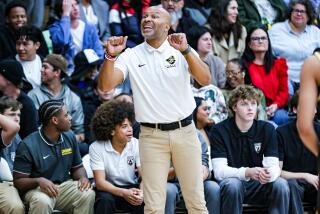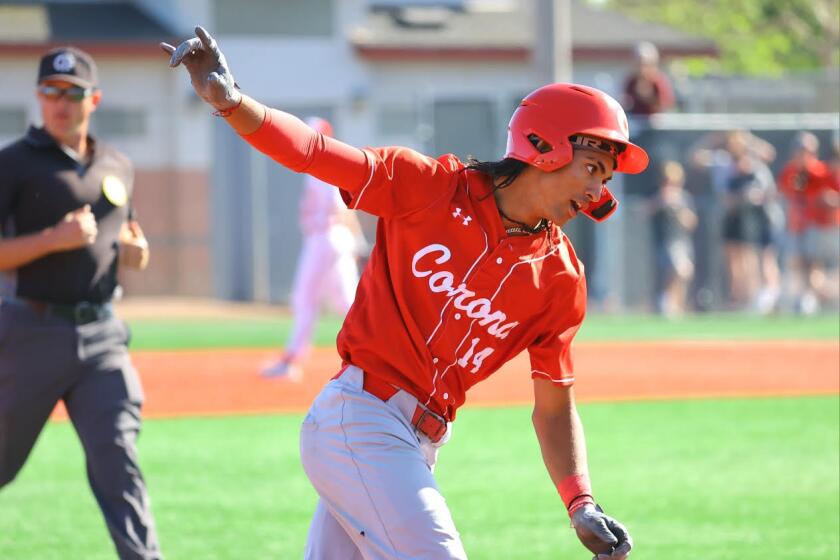Reporter’s Notebook : Many Coaches Would Like to Keep Booster Clubs at Arm’s Length
- Share via
It’s dangerous business to bite the hand that feeds you. But that’s exactly what some high school coaches would like to do.
They would like to take their booster club, shake it by the collar and scream, “Get off my back!”
But that’s too risky. So if there’s an anonymous name or two here, you can understand why. It’s too risky to go on the record when California’s fiscal troubles have forced athletic programs to rely more heavily than ever on boosters to raise money for:
--Equipment.
--Uniforms.
--Facilities.
--Additional coaches.
--Attending premier out-of-town tournaments.
All these are important if a program is to continue to improve, and the point of competing is winning.
Or is it?
And should it be?
Orange County high school sports in the 1990s is not about winning as much as it’s about scholarships and special interests. At least that’s what coaches say parents think. The pressure to win is great enough--winning is the basic measuring stick for success--but added to that is the pressure on coaches from parents, who contend their actions are in the best interests of their child.
So I spoke to a well-respected coach--one who has a former player on an athletic scholarship for a top college program.
Q: Honestly, can you say that eight of 10 players on a basketball team have parents who expect you to get their kid a scholarship, or is it just the three best players?
Coach: “You’d be surprised. Generally, everyone is in it for the scholarships. The days of playing for competition and pride in your school are over.”
Q: What about booster clubs?
Coach: “I’m leery of parents. I’ve found their involvement is usually commensurate with how well things are going, specifically for their child. It’s all based on their playing time. The ones who play the most have the parents who are most active. And they also have the parents who have the greatest expectations in return.”
Right. You raise money, maybe write a check or two, travel to a tournament and get to know the coach on a first-name basis. Suddenly, there’s a perceived “in.” And with that perception comes an expectation of increased playing time, perhaps a starting role with the ball in your child’s hands more often.
“As soon as any school gives in to that pressure and doesn’t put the boosters in their place, then it creates problems everywhere else,” another coach said. “Then they start witch hunts and go after your butt when things don’t go their way.”
This is a contentious society. When people don’t like something, they try to change it--including coaches.
And these attitudes have filtered down to many of the athletes.
Said a coach: “Their thought process is no longer going out for the team, contributing, earning a varsity letter, backing up and being supportive, changing positions, doing whatever it takes to win; their thought process is what position can I play to get a scholarship, what camp do I have to go to, can I play another sport or will it hurt my chances? Everything is so uptight and driven.
“It doesn’t sound like a pretty picture, does it? But it’s real.”
It’s selfish. But that’s the changing face of high school athletics.
What these and other coaches are thinking is that boosters should be boosters. If they can help, they should. If they can give something special to the program, then by all means, do so. But it should be done out of concern for the program, and they should not expect special considerations in return.
Imagine the response if a high school coach, after being diagnosed by his doctor, turned around and told the doctor how to perform surgery. The doctor would tell him to take a hike--if he was being polite about it.
Imagine, then, how a coach feels when members of a booster club expect their sons or daughters to receive special attention, and the parents have no qualms about attempting a squeeze play by withholding financial support or going over the coach’s head with complaints.
It’s a burden no one should shoulder, and enough to to make a coach scream:
“Get off my back!”
More to Read
Get our high school sports newsletter
Prep Rally is devoted to the SoCal high school sports experience, bringing you scores, stories and a behind-the-scenes look at what makes prep sports so popular.
You may occasionally receive promotional content from the Los Angeles Times.






